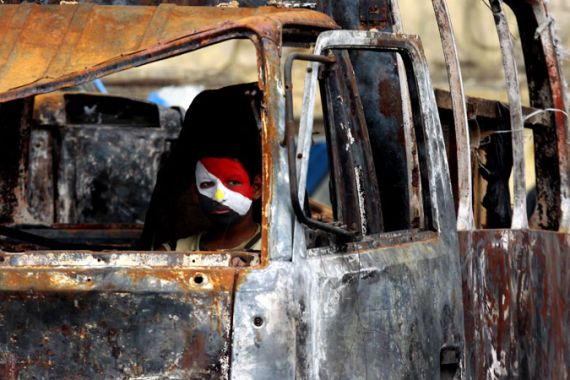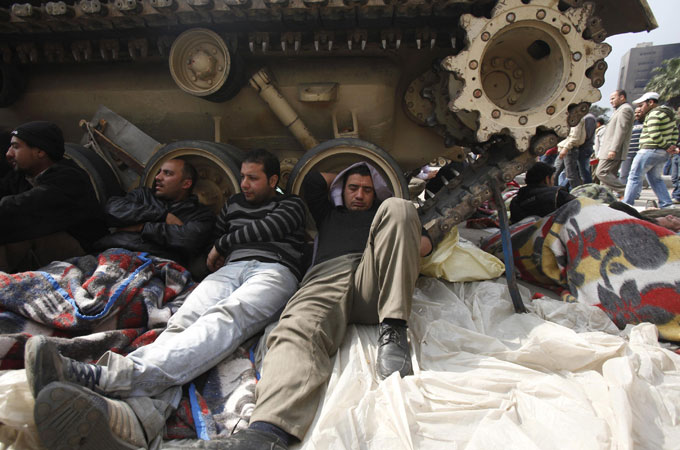Egypt: Negotiation as warfare
Despite negotiations, the pro-democracy protesters in Egypt should play hard ball with the regime in all its avatars.

 |
| Demonstrators have vowed to intensify their battle to oust Egypt’s President Hosni Mubarak [Reuters] |
The Egyptian protest movement has, as a result of its own successes, reached a critical strategic moment in its development. In the light of its failure hitherto to defeat the movement, the Mubarak regime has now adopted the appearance of an eager negotiating party, receptive to the demands of the Egyptian people, and willing to talk to all the key parties in opposition.
The selection of vice-president Suleiman to head this process has been warmly welcomed in the US and European capitals. While negotiations cannot be rejected in principle, and are always the preferred means of resolving complex political conflicts, the movement should assess whether the type of negotiations being offered will advance or hinder the cause of a free Egypt.
The regime cannot be both the cause of the current conflict and the facilitator of negotiations to ensure its resolution. At this point it would be prudent for those who have been captured by a sudden optimism around the negotiations to consider the nature of the Egyptian regime that protesters have been fighting to remove over the past two weeks. The political strategy to reduce the regime to the persona of Hosni Mubarak flies in the face of all the evidence of a regime (understood as a system of government, authorities, rule, authority, control, command, administration, leadership) that has ruled the country with the brutality for the last thirty years, banning opposition, arresting and torturing political dissidents and all but destroying critical media.
The regime is not simply Mubarak, but a vast security network a ruling party that has appropriated much of the Egyptian economy and foreign aid, and a number of prominent political families.
Crucially, it has been sustained by the political and material support of Western governments for the last thirty years. Negotiations headed by Suleiman are negotiations headed by Mubarak. It will have the clear intent of ensuring the survival of the Mubarak regime.
Clean break with past
Fundamental political change, in Africa and elsewhere, is always brought about by the forced removal or collapse of a regime or a negotiations process facilitated by a credible entity. It is never facilitated by an oppressive regime itself, and the Mubarak regime is certainly not set to create historical precedent in this instance. History is replete with examples of ostensibly sincere negotiations that were actually aimed at sustaining and sometimes rescuing an oppressive regime.
The South African apartheid government thought it could negotiate while trying to decimate its chief negotiation partner in the early 1990s and Robert Mugabe negotiated with his Zimbabwean opposition while bludgeoning its supporters into submission in recent years.
The Egyptian resistance movement has remained resilient and united in the face of the Mubarak government’s intimidation and violence, and should now retain that posture in the face of Suleiman’s negotiations. The fact that this process is so warmly supported by the Western powers should be a cause for concern in itself. Since the establishment of the Egyptian Republic, the Euro-Atlantic powers have sought to suppress any indications of independence by Egypt and her people. Suez, their support for Israel in the wars of 1967 and 1973, and propping up a dictatorial regime for more than thirty years is evidence of this.
What is to be done in the light of the push for a negotiated resolution to the current stand-off, both by the regime and its Western allies?
Firstly the resistance must not forget that it holds the strategic political initiative against a regime that is universally discredited amongst Egyptians, and that has failed, despite all its efforts, to suppress the movement for a free Egypt. The demands of the resistance are legitimate and its legitimacy is derived from the Egyptian people, not Western capitals. Negotiations must therefore not be entered as a means of satisfying the Euro-Atlantic axis, but only if it can realise the objectives of a free Egypt.
Negotiations must be facilitated and managed by a credible institution. In this case numerous proposals have been made including a group of eminent Egyptian intellectuals, political, military and religious leaders. What is crucial is the credibility of the group and its legitimacy amongst the Egyptian people.
The fundamental outcome of the negotiations must be clear at the outset. While Suleiman and Mubarak – and some of their Western backers – continue to refer to their commitment to dealing with the “concerns of the protesters” as if these are minor issues, any negotiations must have the explicit objective of establishing a functioning democratic order, free expression of ideas and the disbanding of the oppressive state agencies that have brutalised the Egyptian people, not just in the past two weeks but for the last thirty years.
Negotiation is a tactic of political warfare and the Egyptian resistance movement must realise that the Mubarak regime is using it as such. The regime seeks to use its Suleiman-led negotiations as a back door to retaining power. In doing so, to use a metaphor by South African anti-apartheid leader Joe Slovo, it is trying to prevent the resistance snowball from becoming an avalanche and sweeping it away.
David Africa is an independent security analyst based in South Africa. He has previously worked in counter-terrorism intelligence and research, and served in the underground of the then-banned African National Congress in South Africa.
The views expressed in this article are the author’s own and do not necessarily reflect Al Jazeera’s editorial policy.
